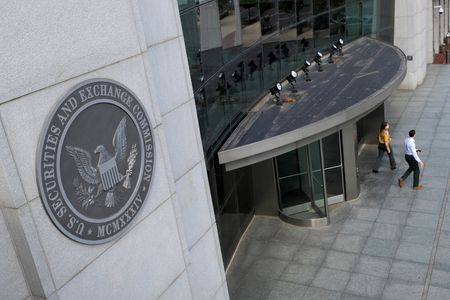By Douglas Gillison
WASHINGTON (Reuters) -Wall Street’s top regulator on Wednesday unanimously voted to propose a rule barring traders in asset-backed securities from betting against the very assets they sell to investors, behavior that became infamous in the wake of the 2008 global financial crisis.
The rule is among the last to be adopted under the landmark Dodd Frank Wall Street reform legislation of 2010, according to SEC officials. Those reforms sought to address the root causes of the mortgage crisis. An earlier version of the conflicts rule first proposed in 2011 was never finalized.
The sweeping 2010 legislation, named for its sponsors – Senator Chris Dodd of Connecticut and Representative Barney Frank of Massachusetts – aimed to protect investors and taxpayers by preventing the buildup of risk and liability in the financial system.
Among other things, it contained financial stability measures governing banks deemed “too big to fail” and created the Consumer Financial Protection Bureau.
In the years after Dodd-Frank’s enactment, Democratic lawmakers complained that the SEC had failed to meet a 270-day deadline to issue a rule implementing Dodd Frank’s ban on betting against the same asset-backed securities traders sell to investors.
In unveiling the proposal on Wednesday, SEC Chairman Gary Gensler acknowledged this was an “unfinished step” in post-crisis reform. The proposal is now subject to public comment for at least 60 days.
SEC officials say it would provide exceptions for legitimate activities, such as hedging to mitigate risk, market-making and meeting liquidity commitments.
But at a public hearing ahead of the vote, Republican members of the commission raised concerns that the proposal in its current form might inhibit legitimate activity, forshadowing likely criticism from industry groups.
Republican Commissioner Hester Peirce, a critic of the commission’s current enforcement strategies, said the proposal “cries out for more care in its design,” adding that the rule could have a chilling effect on market participants who are unclear of when and the prohibition applies.
According to SEC officials, traders who disclosed bets contrary to clients’ investments would still run afoul of the rule, something Peirce suggested should be allowed “to cure at least certain types of material conflicts.”
Better Markets, an advocacy organization that promotes more strict financial sector regulation, welcomed Wednesday’s rule proposal but vowed to study it.
Stephen Hall, Better Markets’ legal director, said traders’ conflicts of interest drove the proliferation of sales of worthless mortgage-backed securities, thereby worsening the financial crisis and constituting “some of the most outrageous abuses we saw.”
Without citing prominent recent examples of such conflicts of interest in the asset-backed securities market, SEC officials said the conflicts rule was needed to remove the opportunity and incentive for such conduct.
In 2010, Goldman Sachs agreed to pay a record $550 million penalty to resolve SEC allegations that it had misled investors. A Senate investigation later detailed how Goldman had marketed mortgaged-backed securities to investors without disclosing that the investment bank or others had placed substantial bets that these assets would lose value.
A Goldman representative declined to comment on specific steps the bank has taken in the intervening years to prevent such conduct.
(Reporting by Douglas Gillison in WashingtonEditing by Alexander Smith, Matthew Lewis and Diane Craft)

